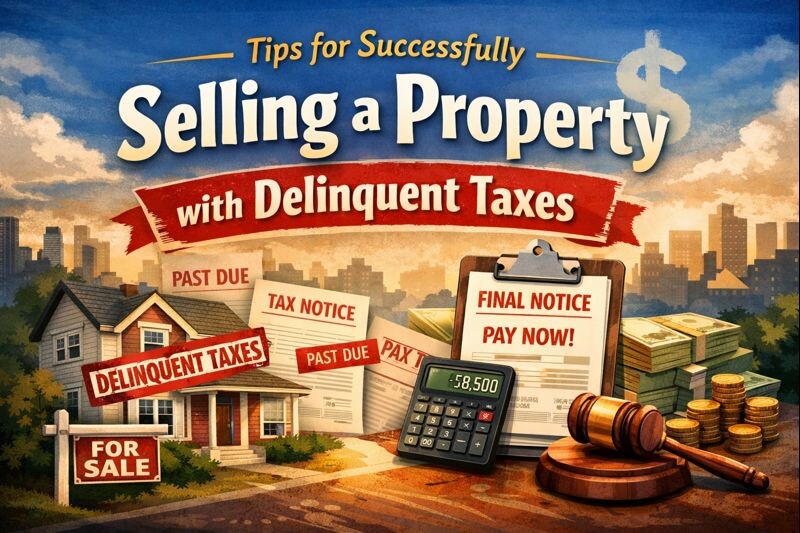
Key Takeaways
- Homes with delinquent taxes can still be sold.
- By being proactive one can avoid foreclosure and keep the equity.
- Quite often cash buyers will take care of the tax payoffs when closing the deal.
- By selling your house as is you will be able to get rid of the issue of repairs.
- Direct sales can seal the deal much sooner than regular listings.
Blog Objective
The goal of this article is to help homeowners understand how to successfully sell a property with delinquent taxes—particularly in Washington—so they can avoid foreclosure, sell fast, and maximize their financial outcome.
Introduction
Owning a home with unpaid property taxes can feel stressful and overwhelming. Many homeowners think they’re “stuck” or that selling isn’t possible—but that’s not the case. It is possible to sell house delinquent taxes and still get a fair outcome, especially if you partner with reputable buyers who are familiar with such cases. The main thing is to be aware of the impact of tax delinquency on your sale and what alternatives you have if you want to sell my house fast without the hassle of months of listings and repairs. Companies such as We Buy House As-Is specialize in helping homeowners in tough situations find fast, fair solutions.
Did You Know?
Recent data from the 2025 Property Tax Delinquency Report indicates that the national property tax delinquency rate reached to about 5.1% in 2025. This data represents an increase in rates when compared with previous years as homeowners find it increasingly difficult to manage rising costs and face affordability challenges. Source
Why Selling a Property With Delinquent Taxes Is Still Possible
Many people assume unpaid property taxes make a home unsellable—but that’s simply not true. You can sell the property as long as the taxes are settled at or before closing. The buyer or title company often handles that payoff, which allows the sale to move forward.
The real key is acting early. If the county hasn’t yet begun foreclosure proceedings, you retain more control in structuring the sale. Once the property goes into foreclosure, options become limited and equity can be reduced.
In Washington, it’s especially important to be aware of local tax laws and deadlines—but even here homeowners still have options to sell, often much faster than they expected.
How to Sell a Home With Delinquent Taxes Successfully

Below are some of the proven tips for turning your tax-delinquent property into a successful sale:
1. Get a Tax Payoff Statement:
Basically, you should get in touch with your local county treasurer or assessor’s office to find out the complete amount you owe for back taxes, penalties, and interest. This figure will be critical when structuring an offer because buyers often use it as a baseline for their cash offers.
2. Sell “As-Is” to Avoid Repairs:
Most of the time homes that faces delinquent taxes also needs some repair works. Listing a home in traditional way may take longer if there are issues that need to be rescued. Selling your house as-is can eliminates the need for costly fixes and help you attract buyers who can buy quickly.
3. Choose Cash Buyers Who Understand Delinquent Taxes:
Many investors and cash home buyers WA specialize in properties with tax issues. Keeping in mind that traditional buyers mostly depend on financing, these guys can move faster, pay cash, and even help you take care of the tax issue during the closing of the sale.
4. Be Upfront About the Tax Situation:
Honesty with buyers or investors builds trust and speeds up due diligence. Giving accurate details about delinquent taxes means fewer surprises later, which helps your sale close faster and more smoothly.
5. Skip Traditional Real Estate Listing:
Listing a home with delinquent taxes might cause you a lot of trouble and unhappy sellers in the end. If you want to sell my house fast, then you might consider direct sales to investors as the best option. They pay in cash thus their deals do not get held up by bank loans that may be denied due to the existence of liens or tax issues.
The Benefits of Working With a Direct Buyer
Companies such as We Buy House As-Is provide several advantages:
- Speed: Cash transactions can close in days, not months.
- Simplicity: No staging, no repairs, and no open houses are required.
- Tax Resolution: Back taxes can be paid during closing, settling your debt.
- Certainty: Cash offers reduce the risk of financing falling through.
These advantages make the process of selling even a tax problem property smooth and simple for homeowners.
Special Considerations for Inherited, Vacant, or Problem Properties
Homes that are vacant, inherited, or need upgrades often go into tax delinquency simply because they’re hard to manage. In case you are facing any of the scenarios mentioned above, selling to a trustworthy investor or cash buyer especially a company proficient in tax matters could be a perfect way out. These buyers understand how to handle complex title issues and unpaid taxes so you don’t have to deal with months of uncertainty.
Why Acting Quickly Matters
The longer a property remains delinquent, the higher the penalties and interest will be, and the risk of foreclosure gets bigger. If you’re nearing foreclosure or already facing county action, time becomes critical. Acting early and choosing the right buyer can preserve your equity and help you sell house delinquent taxes before everything goes out of control.
In urgent situations many homeowners choose We Buy House As-Is as the great choice because they provide a quick, straightforward process with visible conditions that help sellers to move on without prolonged stress.
Final Thoughts
Selling a property with delinquent taxes is not only possible—it can be done quickly and with fewer headaches than you might expect. If you want to sell my house fast, working with skilled cash home buyers WA might be the key to success. When you have the proper plan, openness, and assistance from a reliable company such as We Buy House As-Is, you will be able to close smoothly, settle your tax liabilities, and continue living your life.
Frequently Asked Questions (FAQs)
Ques1. Can I sell my house if I owe back property taxes?
Ans: Yes. As long as taxes are paid at or before closing, homes with delinquent taxes can still be sold.
Ques2. Will back taxes lower my sale price?
Ans: If you have unpaid taxes, they will be deducted from the net proceeds, but the market value of your home will not vanish. Buyers often factor tax payoff into their offer.
Ques3. How quickly can I sell a tax-delinquent property?
Ans: If you sell to a cash buyer, the deal can typically be closed within 7 to 14 days, which is a lot quicker than the usual listings.
Ques4. Do I need repairs before selling?
Ans: Not if you sell “as-is.” Cash buyers often purchase homes regardless of condition.
Ques5. What if I don’t manage to sell before the bank forecloses?
Ans: Should the foreclosure take place, the county has the right to auction off the property, and you might lose any equity you have in the house. Selling early is typically the better option.
